Early on a Saturday afternoon at the Hilton Head Branch, Beaufort County Library, a few children and their parents are gathered and quietly chatting. The youngsters have selected books and are comparing titles, while the adults are smiling, encouraging, and exchanging updates with each other about how their children are doing in school and sports, when in walks Greta, a large German Shepherd, with her owner, Mame Bowser.
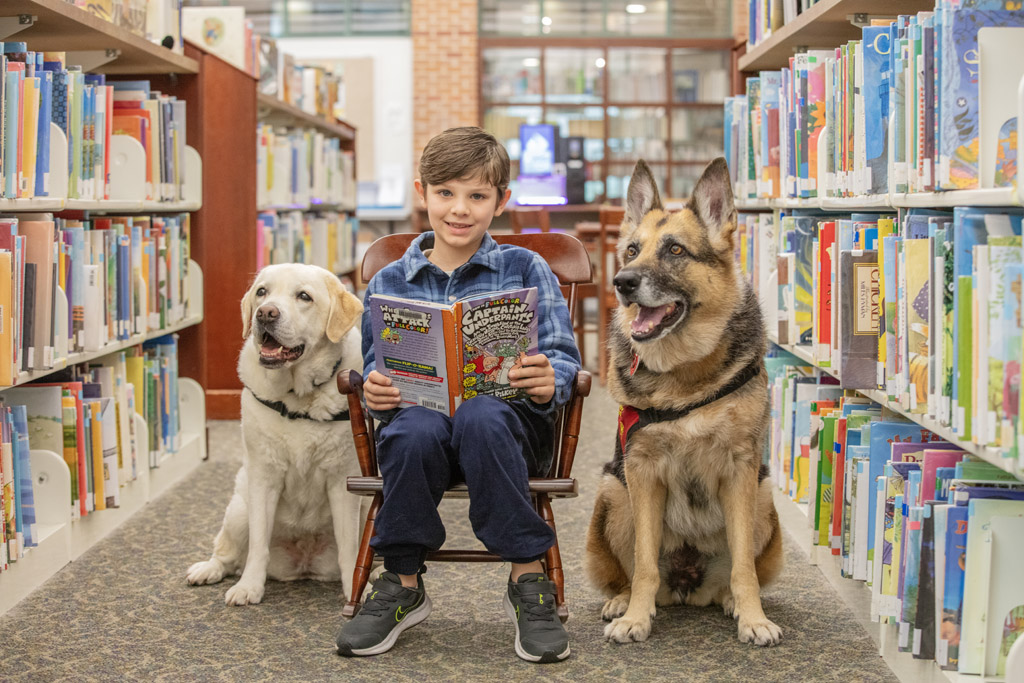
Wyatt Braden shares a chapter of his favorite Captain Underpants book with Nellie and Greta.
Surprisingly, no one bats an eye – not even the librarian. In fact, everyone seems thrilled to see Greta, who is greeted (and who even acts a little) like a celebrity.
On a different day at a different place, something similar occurs. This time, it’s at the Preston Health Center, on the campus of The Cypress of Hilton Head. It’s early afternoon and the residents have finished lunch. Some are gathered in the common area while some have gone to their rooms, and in walks another German Shepherd. This one is Vinnie, led by owner Bowser. Again, no one seems disturbed, and Vinnie is treated like a celebrity.
So, what gives? Since when is a large German Shepherd dog welcomed and adored at two places where order, calm, and silence are the convention and certainly dogs are not?
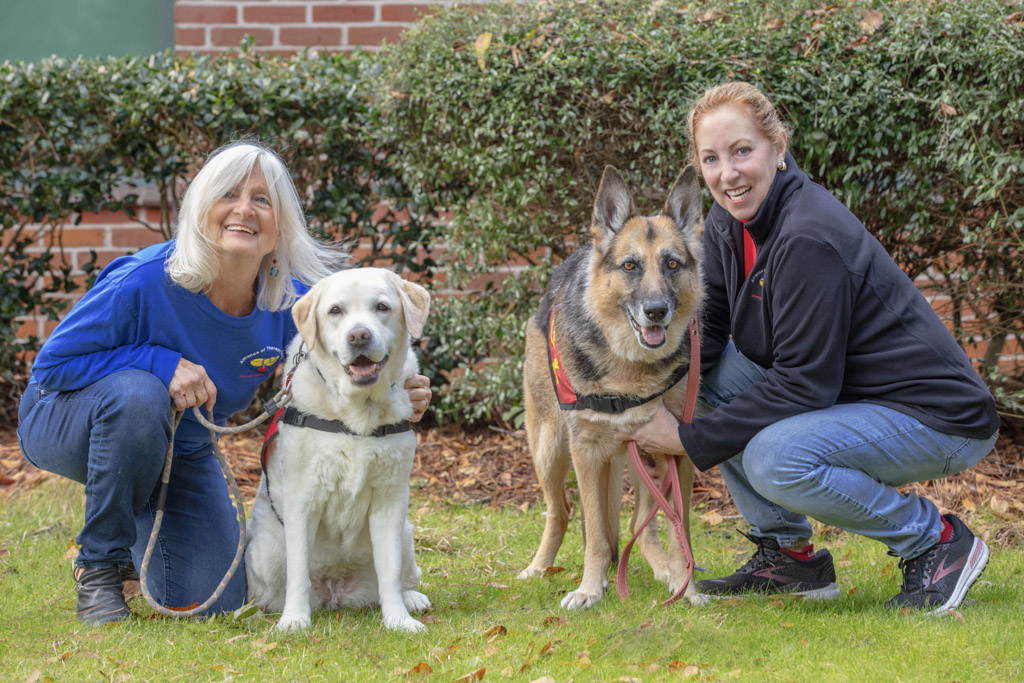
Therapy Dogs Nellie (Lab) and Greta (German Shepherd) spend a Saturday afternoon listening to children read at the Hilton Head Library. Their handlers, Carol Protch and Mame Bowser, volunteer with Alliance Therapy Dogs.
The answer is that Greta and Vinnie are Alliance Therapy Dogs whose presence serves a distinct and wonderful purpose both with the children at the library and the elderly at the Preston. And Greta and Vinnie aren’t the only dogs who are welcome. There are several local canines and their owners who visit these and other places in the Lowcountry, including nursing homes, assisted living facilities, rehab facilities, mental health institutions, schools, hospitals, cancer centers, hospice facilities, and college campuses. Some dogs also provide therapy in patients’ homes.
Alliance Therapy Dogs (ATD) is an international registry of certified therapy dog teams that provides testing, certification, registration, support, and insurance for members who volunteer with their dogs in animal-assisted activities. Their objective is to form a network of caring individuals and their special dogs who are willing to share smiles and joy with people, young and old alike.
“We have 60 to 70 therapy dog teams in Beaufort County, and each dog and owner have been through the same process with ATD to gain certification,” Bowser said. “Along with the steps of the process, a dog’s natural disposition is a primary factor.”
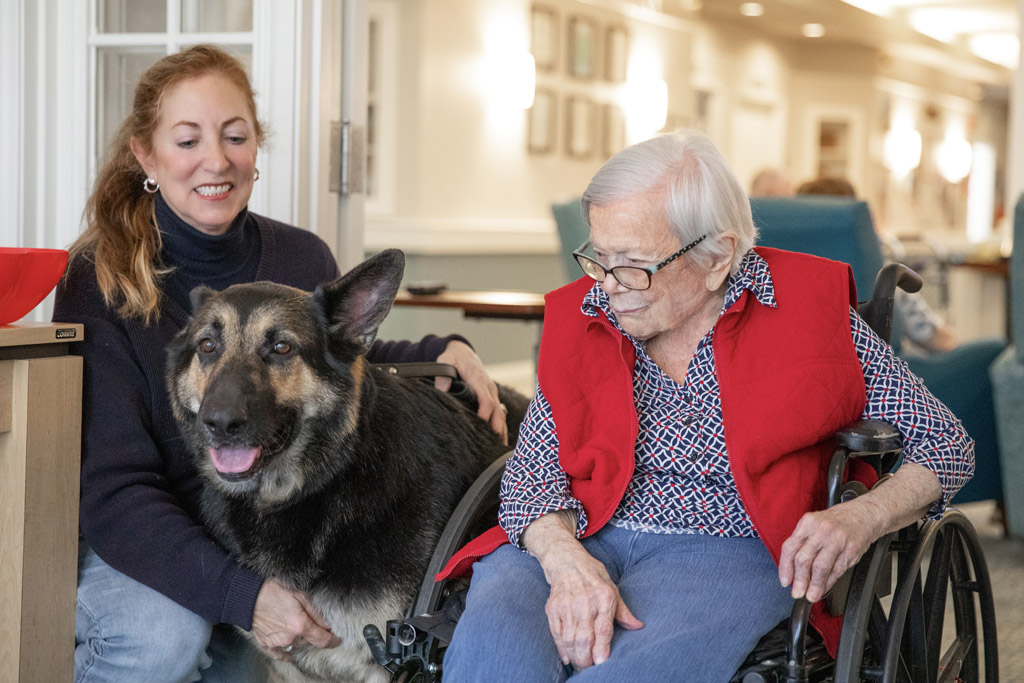
Mame Bowser and her German Shepherd, Vinnie, visit with Alice Camp at The Preston Health Center.
Unlike other therapy dog organizations, ATD has a unique testing process that involves a handling exam with your dog. ATD testing is designed to make sure you and your dog have a good relationship with each other and that your dog has the right temperament for therapy dog work.
After the test, a tester/observer (T/O) will monitor you and your dog during three visits to facilities that include two visits to a medical facility. During these supervised visits, the T/O will instruct you and your dog on the art of visiting and give advice and guidance while observing you in action. If all goes well, the T/O will recommend you and your dog for certification with ATD.
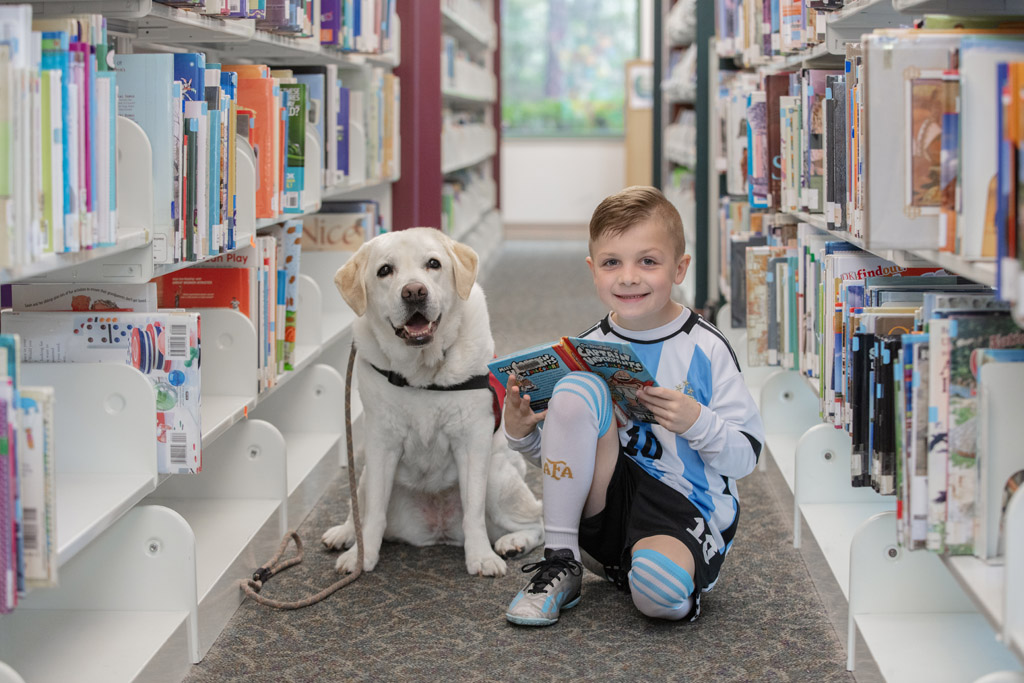
JJ Protch reads to Nellie.
“While everyone thinks their dog is a therapy dog, sometimes they’re not,” Bowser said. “Some dogs aren’t great with people, so disposition is important. Too, a dog’s leash manners are important. Do they walk nicely on the leash? And do they listen to you? For example, at a hospital or nursing facility, we must always stay out of the way of patients’ wheelchairs, so when you step back, the dog must also step back. At a school or the library, a dog must not become anxious if children get loud or boisterous. They must sit and stay on command and exhibit no aggression.”
Bowser, Greta, and Vinnie spend time also with the memory care patients at The Preston, and Bowser shared that many times they don’t remember who she is, but they always remember Greta and Vinnie.
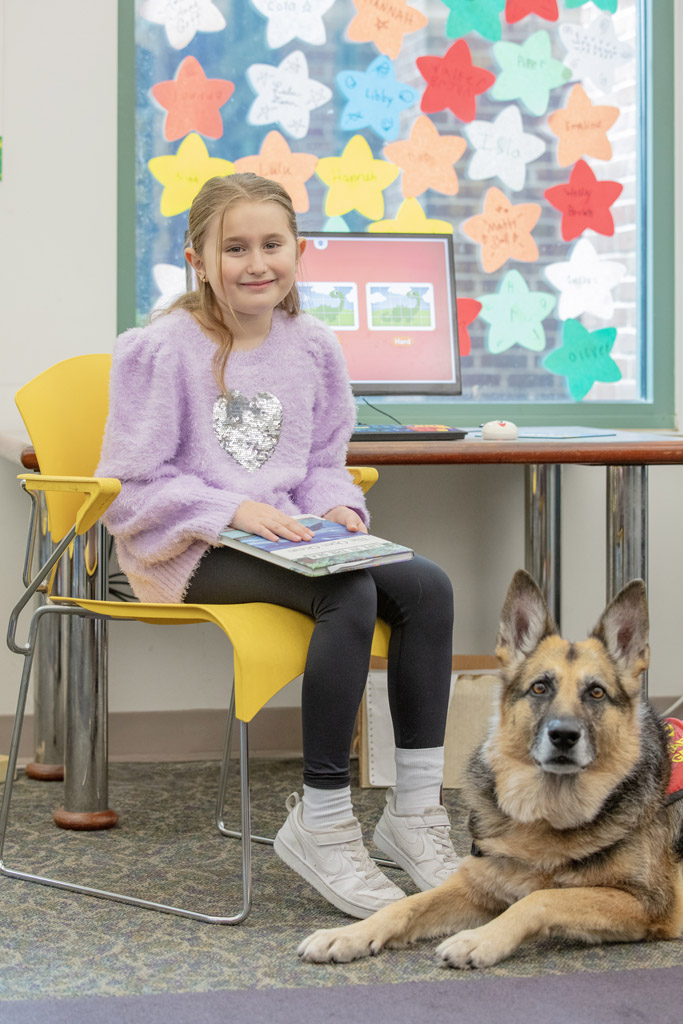
Vienna Davis regales Greta with a publication about the world’s oceans.
“It is an absolute pleasure to have Alliance Therapy Dog teams come to visit at The Preston Health Center,” said Celia Furr, memory care coordinator. “Residents have very different interactions with the dogs. Some lean in and talk very softly like a serious conversation. Some sing to the dogs, but most of the residents just want them close by. Our staff has grown very attached as well. If the day has been stressful or sad, a dose of canine affection will lighten the mood.”
Greta has a similar effect on the children with whom she interacts. Bowser and Greta and other therapy dog teams visit the Hilton Head Branch of the Beaufort County Library one Saturday a month for the Read to a Dog series. Since the early 1990s, public libraries have hosted programs where children can practice reading aloud in non-threatening environments.
“Being able to read aloud fluently and confidently is a skill that is used throughout everyone’s lifetime,” said Julie Bascom, youth services manager at the Hilton Head library. “Having furry friends to read to allows emerging and struggling readers to practice, improve, and gain confidence. The therapy dogs are extremely well trained, making them excellent listeners. The dogs are well behaved – making our participants feel comfortable and secure as they practice.”
All the adults actively listen to the readers and encourage the children by providing definitions and context for any unfamiliar words. Participants sign up for a guaranteed 15-minute slot. However, most readers can rotate through four to five dogs within the hour.
“The fact that the adults are so encouraging makes this an all-around stress-free and fun experience for everyone,” Bascom said. “As a bonus, the kids like hearing about each dog’s like and dislikes.”
Anyone interested in becoming certified with ATD should keep a few things in mind:
• Dogs must be at least a year old to be evaluated.
• Dog/owner must have a minimum of a six-month relationship.
• All applicants must pass a background check.
• All members must be insured.
• All team members must provide an updated, veterinarian-signed health certificate at the time of application and annually thereafter.
• All members must make a visit at least once every three months to be in good standing.
Testing involves a handling exam (loose leash walking, turning, changing pace; does the dog show interest in people? How is the dog when approached?) and three accompanied observations, two of which must be in a medical environment.
“At the end of the day it’s about the temperament of the dog,” Bowser said. “Typically, ATD owners have very socialized dogs that are very comfortable around people and in different surroundings. Most handlers have invested significant time in socializing and training their pups.”
To learn more about ATD, visit TherapyDogs.com. To learn more about the Read to a Dog series at the library, call (843) 255-6529.


